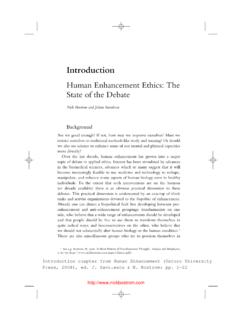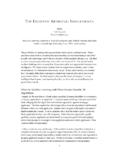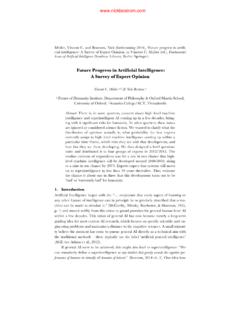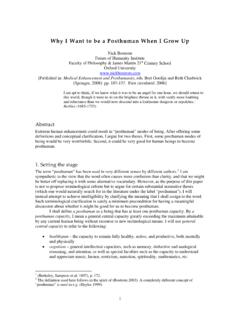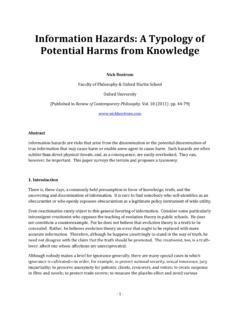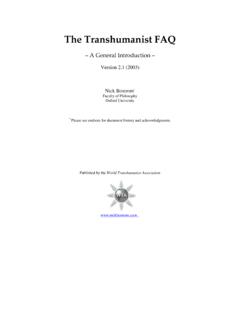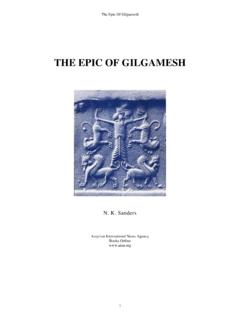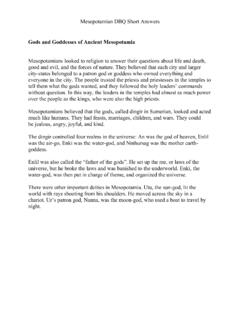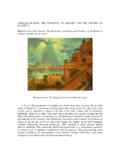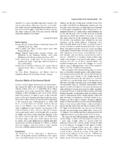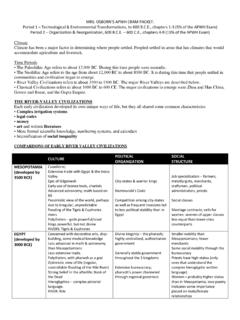Transcription of Cultural and philosophical antecedents - Nick …
1 A HISTORY OF TRANSHUMANIST THOUGHT Nick Bostrom Faculty of Philosophy, Oxford University (2005) [Originally published in Journal of Evolution and Technology Vol. 14 Issue 1 April 2005; reprinted (in its present slightly edited form) in Academic Writing Across the Disciplines, eds. Michael Rectenwald & Lisa Carl (New York: Pearson Longman, 2011)] 1. Cultural and philosophical antecedents The human desire to acquire new capacities is as ancient as our species itself. We have always sought to expand the boundaries of our existence, be it socially, geographically, or mentally. There is a tendency in at least some individuals always to search for a way around every obstacle and limitation to human life and happiness.
2 Ceremonial burial and preserved fragments of religious writings show that prehistoric humans were disturbed by the death of loved ones. Although the belief in a hereafter was common, this did not preclude efforts to extend one s earthly life. In the Sumerian Epic of Gilgamesh (approx. 1700 ), a king sets out on a quest for immortality. Gilgamesh learns that there exists a natural means an herb that grows at the bottom of the He successfully retrieves the plant, but a snake steals it from him before he can eat it. In later times, explorers sought the Fountain of Youth, alchemists labored to concoct the Elixir of Life, and various schools of esoteric Taoism in China strove for physical immortality by way of control over or harmony with the forces of nature.
3 The boundary between mythos and science, between magic and technology, was blurry, and almost all conceivable means to the preservation of life were attempted by somebody or other. Yet while explorers made many interesting discoveries and alchemists invented some useful things, such as new dyes and improvements in metallurgy, the goal of life extension proved elusive. The quest to transcend our natural confines has long been viewed with ambivalence, however. Reining it in is the concept of hubris: that some ambitions are off limits and will backfire if pursued. The ancient Greeks exhibited this ambivalence in their mythology. Prometheus stole fire from Zeus and gave it to humans, thereby permanently improving the human condition.
4 Yet for this act he was severely punished by Zeus. The gods are repeatedly 1 (Mitchell 2004). 1challenged, quite successfully, by Daedalus, the clever engineer and artist, who uses non magical means to extend human capabilities. In the end, disaster ensues when his son Icarus ignores paternal warnings and flies too close to the sun, causing the wax in his wings to melt. Medieval Christians held similarly conflicted views about the pursuits of the alchemists, who were attempting to transmute substances, create homunculi in test tubes, and invent a panacea. Some scholastics, following the anti experimentalist teachings of Augustine, believed that alchemy was an ungodly activity.
5 There were allegations that it involved the invocation of daemonic powers. But other theologians, such as Albertus Magnus and Thomas Aquinas, defended the The otherworldliness and stale scholastic philosophy that dominated Europe during the Middle Ages gave way to a renewed intellectual vigor in the Renaissance. The human being and the natural world again became legitimate objects of study. Renaissance humanism encouraged people to rely on their own observations and their own judgment rather than to defer in every matter to religious authorities. Renaissance humanism also created the ideal of the well rounded person, one who is highly developed scientifically, morally, culturally, and spiritually.
6 A landmark of the period is Giovanni Pico della Mirandola s Oration on the Dignity of Man (1486), which proclaims that man does not have a ready made form and is responsible for shaping himself: We have made you a creature neither of heaven nor of earth, neither mortal nor immortal, in order that you may, as the free and proud shaper of your own being, fashion yourself in the form you may prefer. It will be in your power to descend to the lower, brutish forms of life; you will be able, through your own decision, to rise again to the superior orders whose life is The Age of Enlightenment is often said to have started with the publication of Francis Bacon s Novum Organum, the new tool (1620), which proposes a scientific methodology based on empirical investigation rather than a priori reasoning.
7 4 Bacon advocated the project of effecting all things possible, by which he meant using science to achieve mastery over nature in order to improve the living condition of human beings. The heritage from the Renaissance combines with the influence of Isaac Newton, Thomas Hobbes, John Locke, Immanuel Kant, the Marquis de Condorcet, and others to form the basis for rational 2 See (Newman 2004). 3 (Pico della Mirandola 1956). 4 (Bacon 1620). 2humanism, which emphasizes empirical science and critical reason rather than revelation and religious authority as ways of learning about the natural world and our place within it and of providing a grounding for morality.
8 Transhumanism has roots in rational humanism. In the 18th and 19th centuries we catch glimpses of the idea that humans themselves can be developed through the application of science. Condorcet speculated about extending human life span by means of medical science: Would it be absurd now to suppose that the improvement of the human race should be regarded as capable of unlimited progress? That a time will come when death would result only from extraordinary accidents or the more and more gradual wearing out of vitality, and that, finally, the duration of the average interval between birth and wearing out has itself no specific limit whatsoever? No doubt man will not become immortal, but cannot the span constantly increase between the moment he begins to live and the time when naturally, without illness or accident, he finds life a burden?
9 5 Benjamin Franklin longed wistfully for suspended animation, foreshadowing the cryonics movement: I wish it were to invent a method of embalming drowned persons, in such a manner that they might be recalled to life at any period, however distant; for having a very ardent desire to see and observe the state of America a hundred years hence, I should prefer to an ordinary death, being immersed with a few friends in a cask of Madeira, until that time, then to be recalled to life by the solar warmth of my dear country! in all probability, we live in a century too little advanced, and too near the infancy of science, to see such an art brought in our time to its After the publication of Darwin s Origin of Species (1859), it became increasingly plausible to view the current version of humanity not as the endpoint of evolution but rather as an early The rise of scientific physicalism might also have contributed to the belief that technology might well improve the human organism.
10 For example, a simple kind of materialist view was boldly proposed in 1750 by the French physician and materialist philosopher Julien Offray de La Mettrie in L Homme Machine, in which he argued that man 5 (Condorcet 1979). 6 (Franklin et al. 1956), pp. 27 29. 7 (Darwin 2003). 3is but an animal, or a collection of springs which wind each other up. 8 If human beings are constituted of matter obeying s the same laws of physics that operate outside us, then it should in principle be possible to learn to manipulate human nature in the same way that we manipulate external objects. The Enlightenment is said to have expired as the victim of its own excesses.
